Movie Reviews - 2022 posts
Friday August 05, 2022
Movie Review: The Northman (2022)
WARNING: SPOILERS
I’ll take “Hamlet.”
Not that I don’t admire what Robert Eggers has done here. Our culture is way too now-focused and future-focused, and if the movies create anything historical it’s usually from the author or auteur’s youth, and tinged with nostalgia, it’s not from, you know, before the Magna Carta. I might have even made this exact comment when reviewing a movie from China. (Which I can't find, of course.) The Chinese have way more legends from pre-1,000 A.D., so they’re that much more likely to make movies from those periods, while Hollywood, nah, it doesn’t give a shit. Well, Eggers does. As does Alexander Skarsgård.
Apparently Skarsgård, the hunky vampire of “True Blood,” as well as our most recent big-movie Tarzan, has wanted to make his Viking movie for a while now. He’s Swedish born-and-bred, son of Stellan, brother to an unending host of Skarsgård siblings, and he wanted to go full Scandinavian. Good for him. (BTW: Did he ever try out for “Thor”? Just checked: he did. And Marvel went Australia instead. How rude.)
Apparently Eggers was also interested in making a true-life Viking movie. But whose story? Erik the Red? Fran Tarkenton? They wound up going with the tale of Amleth.
Yes, it’s the tale that inspired Shakespeare’s “Hamlet.” So instead of an action hero, they went with the West’s most famous inaction hero.
Slings and arrows
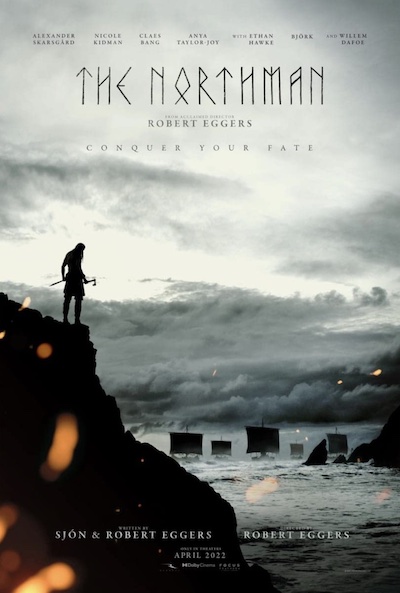 Is “Hamlet” also one of our most famous revenge stories? I don’t think of it that way, but I guess that’s what it is. If revenge is a dish best served cold, Hamlet serves it up not just cold but dumped in the trash in the back alley.
Is “Hamlet” also one of our most famous revenge stories? I don’t think of it that way, but I guess that’s what it is. If revenge is a dish best served cold, Hamlet serves it up not just cold but dumped in the trash in the back alley.
Amleth is also big on the delaying tactic, but there are big differences between the stories. Amleth is a child when his father is murdered (not a young adult), he witnesses his uncle Fjölnir doing it (as opposed to second-hand info from his father’s ghost), he sees his mother being carried away to be ravaged (Hamlet just imagines that one), and Amleth goes into exile (no similar exile for Hamlet). This is what young Amleth says, over and over, as he rows away:
I will avenge you, Father. I will save you, Mother. I will kill you, Fjölnir.
It’s his Inigo Montoya line.
The next time we see him he’s Skarsgardian strong, dirty and brooding with a massive back, and attacking and pillaging with a berserker tribe of Vikings. When he hears that some of their latest victims, Slavs, are being sent as tribute to the now-deposed King Fjölnir, living in his own exile in Iceland with Queen Gudrun (Nicole Kidman) and their children, he doesn’t think, “Well, I guess Harald of Norway did my work for me. Guess I can get on with my life.” The revenge is his life. So he sneaks aboard the boat to be part of the tribute. Only Olga of the Birch Forest (Anya Taylor-Joy) notices. Will she give him away? Will they get together?
Yes. It's a serious, indie movie that goes for verisimilitude as much as possible, and with deep historical research into the period involved. But some tropes die hard, such as, “Hey, the two best-looking actors are going to shack up. How nice for them.” Eggers also includes mysticism and witchcraft as an almost daily part of life. Because we’re getting the POV of the people involved and they believe that it’s happening? Or maybe Eggers himself believes in that shit? Who knows? The asides to the mystical took away from the story for me, to be honest. What’s Willem Dafoe’s head doing here? Is that sword his dead father’s or just a sword?
In Iceland, Fjölnir’s eldest son, Thorir (Gustav Lindh), dismisses the new group of slaves as unworthy. He somehow misses the tall, hulking man among them until Amleth all but roars. Thus begins his rise. A game of knattleikr is played against another farm, the point of which seems to be to throw a ball and hit an opposing post, but the point quickly becomes survival as players maim or kill one another. In the end, it’s just Amleth and Thorfinnr, played by Hafpor Julius Bjornsson, the Icelandic strongman champion who played “The Mountain” on “Game of Thrones.” Which is when Fjölnir’s youngest son Gunnar (Elliott Rose) joins the action, stealing the ball, and is about to be killed by Thorfinnr. Amleth saves him and kills the Mountain.
Yes, Amleth is doing the opposite of what he promised to do. He’s actually saving Fjölnir’s kids. But such saving means rising further and getting closer to his target. Is that part of the plan or mere happenstance? Privileges are given, including Olga, and there’s more nighttime mysticism.
At some point Amleth kills some of Fjölnir’s men and nails them to a wall. To what end? Then he reveals himself to his mother to a not-good end. Turns out his beloved mother was originally chattel for his father, King Aurvandil War-Raven (Ethan Hawke); she was the spoils of war, and Amleth was the result of a rape. She was actually part of the coup. As a child, when he saw Fjölnir carrying her away? She wasn’t screaming, she was laughing. I’m like, “Wait, did she know Fjölnir wanted to kill Amleth?” She did. She didn’t care. She was good with it.
You’d think at this point Amleth would kill her, too, but, sure, I guess it’s tough to switch gears like that. But it means he’s lost his advantage—his identity has been revealed. So he splits. Then when Fjölnir is about to kill Olga, he shows up on a hillside with Thorir’s heart in a sack, offering a swap: her life for the boy’s heart. Fjölnir takes the deal and then tortures Amleth. Somehow, by raven, Valkyrie or Olga, he escapes; and even though Olga is pregnant with his children (twins), and they’re on a boat away from Iceland, he can’t leave his oath undone. He swims back to shore.
He still doesn’t act much. In the village, his mother attacks him so he kills her (through the heart—she thanks him, a good bit); then Gunnar attacks him so he kills him, too. Then he and Fjölnir meet at the Gates of Hel, which I took to mean more mysticism, but apparently it’s Hekla, a volcanic mountain in Iceland. And in the heat and the dark, nude or near-nude, they battle, and Fjölnir is beheaded after mortally wounding Amleth. And there’s no Fortinbras or Horatio to offer benedictions.
Indifferent honest
I got bored. Sorry. The story never quite catches, and Amleth’s inaction is never interesting, or resonant, or poetic.
What’s inside him? Hamlet spilled his guts constantly, and poetically, while Amleth keeps spilling guts literally, and it’s usually the wrong guts. I recently rewatched Michael Mann’s “Thief” and a cool thing in the final siege is that our hero kills the head bad guy first, then fights subordinates on the way out. The trope is usually the opposite—building to the big confrontation—which is what Eggers does. For all of his 9th-century verisimilitude, it’s another Hollywood trope he buys into.
Friday July 29, 2022
Movie Review: Doctor Strange in the Multiverse of Madness (2022)
WARNING: SPOILERS
For the longest time superhero creators have insisted, “We’re not schlock, our stuff should be taken seriously,” and the movement has been in this direction—away from its cheesey, strongman-underwear origins and toward darkness and seriousness. It’s worked so well that Marvel is now confident enough to trot out something called “Doctor Strange in the Multiverse of Madness,” which, if it had been made in the 1950s, would’ve starred Vincent Price and been presented in Emergo-Vision. It would’ve been schlock.
This isn’t schlock. But is it any good?
Maybe within the multiverse there’s a critic named Erik Lundegaard who likes movies set in the multiverse. I just think Marvel is overdoing it. The bad guy used to be somebody robbing a bank. Now it’s someone shattering the fabric of reality. Again.
Déjà vu all over again
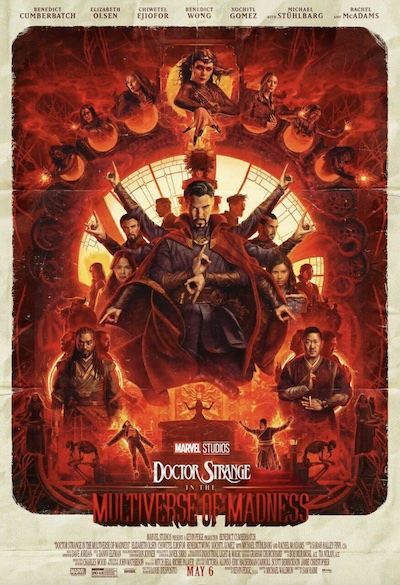 The beginning of the movie, I assumed, was a recap of the multiverse craziness in “Spider-Man: No Way Home.” Then I realized, “No, it’s a different adventure. In media res. Cool.” Except my secondary assumption was that this was some other Doctor Strange adventure, set in that weird Neutral Zone-y realm, and it would soon end and the proper story would begin. But this was the proper story.
The beginning of the movie, I assumed, was a recap of the multiverse craziness in “Spider-Man: No Way Home.” Then I realized, “No, it’s a different adventure. In media res. Cool.” Except my secondary assumption was that this was some other Doctor Strange adventure, set in that weird Neutral Zone-y realm, and it would soon end and the proper story would begin. But this was the proper story.
Doctor Strange (Benedict Cumberbatch) and a Latina teenager, America Chavez (Xochitl Gomez), are being pursued by a demon-monster who wants the girl’s power, and they need to reach the Book of Vishanti, which is glowing on a rock in the Neutral Zone-y place, but the demon is too powerful. So Doctor Strange, our hero, says he needs to take the girl’s power himself. And he tries to do this against her wishes. So obviously something is up. Then the demon spears him, the girl is almost torn apart, and he wakes up. Ah, it was just a dream.
Or was it?
That day, after attending the wedding of Dr. Christine Palmer (Rachel McAdams), the woman he loves, Strange sees an octopus monster tearing up Midtown and springs into action. And that’s where he meets the Latina girl he dreamed about.
You see, according to the film, our dreams are often (or always?) visions of other versions of the multiverse. I kind of liked that idea. It reminded me of when I lived in Taiwan, hearing a theory that in our dreams we can travel through time, and that déjà vu is simply arriving at a moment in time you’ve already visited in a dream.
Anyway, because he sees some witchcraft markings, Strange goes to see his Avengers pal, Wanda Maximoff (Elizabeth Olsen), to see if she can't interpret. Turns out, whoops, she’s the one making all this happen. The reveal is lame (she says America’s name even though he hasn’t), but isn’t a hero in one movie becoming the villain in the next kind of unprecedented? Can’t remember that ever happening with such a prominent recurring character before.
She’s the villain in this one because she’s nuts. Her brother Pietro was killed in, I guess, “Avengers: Age of Ultron,” and I think she had to kill the Vision, her love, during the battle with Thanos in “Avengers: Infinity War,” and all of this took a toll and now she has PTSD. On the “WandaVision” TV series this meant she used her powers—apologies, I’m sorting this out as much for me as you—to create various sitcom-like worlds where she and Vision were happy and domestic and raised a family, including two boys, Tommy and Billy (Jetty Klyne and Julian Hilliard). And apparently that fictional life actually exists in one of the universes of the multiverse. And that’s why she wants the Latina girl. America’s power is the ability to traverse the multiverse—though she hasn’t figured out how to control it yet—and Wanda wants the power for herself. So she can go to that universe, kill her other self, and raise a family. Like heroes do.
Oh right, I guess she’s also been corrupted by the “Darkhold,” a book of sorcery, which has turned her into the all-powerful Scarlet Witch.
How all-powerful? Super all-powerful. Doctor Strange teams up with the Sorceror Supreme (Benedict Wong), and all his disciples at a monastery in Nepal, dozens of them, and she blasts through them like they’re Swiss cheese. Strange and America escape into another universe, where that Doctor Strange is dead and a hero—honored in statue form. Except, whoops, we learn, by and by, from a group called the Illumanati (Mordo, Captain America, Captain Marvel, Black Bolt, Mister Fantastic and Prof. X), that that universe’s Doctor Strange used the Darkhold to beat back Thanos but created an “incursion” into another universe, which destroyed it. So he’s actually a destroyer of universes. That’s why he himself was destroyed and the Illuminati created. This Illuminati distrust all Doctor Stranges. They think they’re all bad. Which is an interesting form of prejudice the movie doesn’t delve into. I mean, couldn’t Strange say, “In my universe, Captain America is male, Captain Marvel is white, and Mister Fantastic works at a paper-supply company in a small town in Pennsylvania. Maybe I’m different. Maybe give me a chance.”
Alright, let me delve for a second. Marvel’s multiverse started out as a way to bring together different characters (“Into the Spiderverse”), or different actors who’ve played the same character (“Spider-Man: No Way Home”), and sure, in this one, we finally get Patrick Stewart’s Prof. X in the MCU; but otherwise all the Doctor Stranges look like Bendedict Cumberbatch and all the Wandas like Elizabeth Olsen. Because? Because the Tobey-Garfield-Holland triumverate is unnecessary. Because most Marvel characters don’t have the cinematic legacy of a Spider-Man.
But Marvel also uses the multiverse concept to make itself more multicultural and inclusive without any real heavy lifting: the Captain Marvel we see here is Black (played by Lashana Lynch, or Maria Rambeau), and the Captain America we see here is female (played by Hayley Atwell, or Peggy Carter). But even trying to be inclusive and politically correct, they still fuck it up. When the Illumanati face off against Wanda, landing in a kind of V formation, guess who’s at the front? I mean, if you’re them, wouldn’t you lead with Captain Marvel—one of the most powerful characters in any universe? Nope. They put Silly Putty Man in front. In what universe does that make sense? No universe.
And it goes as poorly as you’d think. He brags on Black Bolt but Wanda removes BB’s mouth and he blows up his own brain. Then she fillets Mr. Fantastic and—pop—there he goes, too. Only then do the women think to spring into action. A bit late, girls.
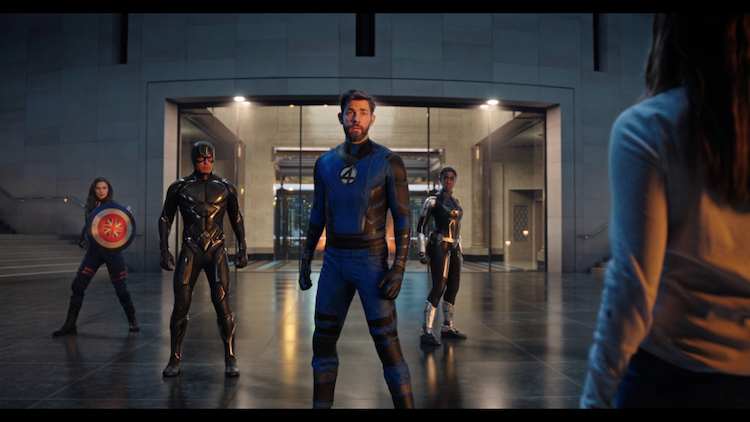
“Sure, the Black chick is one of the most powerful figures in the universe, but let's lead with Silly-Putty Man.”
The horror
If Mr. Fantastic being filleted and Black Bolt losing his mouth sound horrific, well, yes. The horror elements in the movie keep getting stronger until Doctor Strange, in that other universe, “dreamwalks” as the Frankensteinian corpse of another universe’s Doctor Strange in our own. (Don’t try to unpack that.) It’s a nice homage to Cumberbatch’s stage work as The Monster in “Frankenstein,” but a bit unnecessary. Once I realized Sam Raimi directed this, though, it all made sense. That's his bag. Horror homages + a Bruce Campbell comedic cameo: I should’ve realized Raimi was involved sooner.
I do like how they finally defeat Wanda. Not by battling her but by giving her what she wants. In control of her power now, America transports her to that other sacharine universe, where the kids she covets see her as a monster. Which is when she realizes what she’s become. And how she has to close the Darkhold so no one can ever blah blah blah. I think she sacrifices herself, too. At least she’s buried in the rubble she creates. Hey, maybe we should erect a statue to her.
You’d think Marvel would at least give Doctor Strange a shawarma moment at the end but no. We see him fix his broken wristwatch—a metaphor, I believe, for moving past his lost love—then he walks along the street, practically whistling a tune, when he’s struck down in pain … and develops a third eye! Which means … somethingorother. And in the mid-credits sequence, Charlize Theron shows up to take him … somewhere or other.
Give him a rest, Marvel. Give us a rest. In the multiverse, I’m sure there’s an Erik Lundegaard who gives a shit. Just not this one.
Monday July 18, 2022
Movie Review: Elvis (2022)
WARNING: SPOILERS
What’s the tragedy of Elvis?
The man sold more records than any solo recording artist in history and remade our culture. He opened it up racially and sexually. He supercharged it. He landed like a fucking bomb in middle-American living rooms and thrilled kids and perplexed and frightened and angered adults. He crossed lines he didn’t know existed. The generation gap became a chasm.
He also died drug-addicted and overweight on a toilet seat at age 42.
So what's his tragedy?
Baz Luhrmann’s answer is that Elvis wound up in the Mephistophelean clutches of a fat Dutch prick of a carnival barker named Col. Tom Parker (Tom Hanks).
My answer would be different.
Devil in Disguise
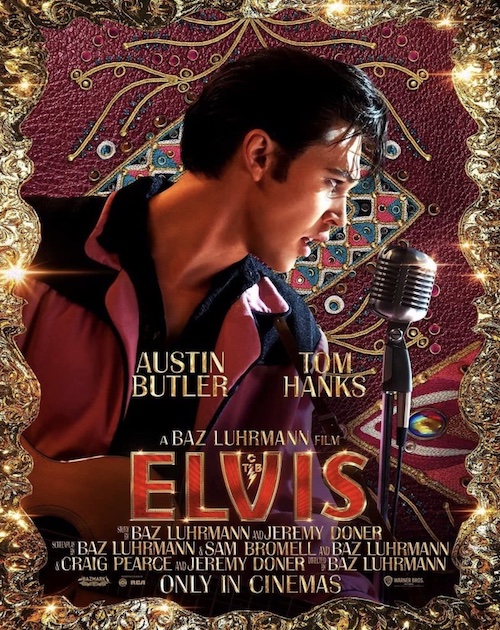 Just as reactions to Elvis in 1956 veered wildly, so, in the run-up to its release, reactions to “Elvis” veered wildly. I’d heard it got a 12-minute standing ovation at Cannes. I also heard it was awful, unwatchable, over-the-top crap. And then, counter to the counter, I heard it was the must-see movie of the summer.
Just as reactions to Elvis in 1956 veered wildly, so, in the run-up to its release, reactions to “Elvis” veered wildly. I’d heard it got a 12-minute standing ovation at Cannes. I also heard it was awful, unwatchable, over-the-top crap. And then, counter to the counter, I heard it was the must-see movie of the summer.
To me, it’s neither unwatchable nor must-see. But I'm glad I saw it.
“Elvis” is kind of like Elvis’ career. It’s fun early, and yes, over-the-top and operatic (it’s Baz, baby), and then gets bogged down in the later years. It gives us Elvis ’56, zips through the Army and movie years to the ’68 comeback special, and then it’s all about the how and why of Vegas. Post-’68, we keep getting the same tragic note. Elvis works up the courage to defy the Colonel, and he’s about to go out and do it, and finally tour the world, baby, until the Colonel starts talking. Then we get the snow job, and Elvis buys it, and he winds up back in the penthouse suite of the International Hotel, trapped, pill popping, an old, Howard Hughes figure before his time, with the inevitable sad end on the toilet on the horizon.
You’d think one of those times, after he’d declared himself free, that his Memphis mafia friends and bandmates, Red or Scotty or Bill, would tell everyone, “OK, keep the fucking Colonel the fuck away from him!” Nope. Instead, Elvis is heading out the door, maybe into the parking garage, and there’s the Colonel again, and he begins talking again, and Elvis begins listening again. And everyone else just stands around and lets it happen.
So it’s a bit one-note. And is it tragic? He’s not caught in a trap, as he sings, because there’s a very easy way out. The Colonel gives him and his dad a bill for $7 million? Talk to a fucking lawyer. Shit, a good lawyer would just wipe this shitstain away—out of your life and probably out of the country. He’d wind up owing you $7 mil.
I think the tragedy of Elvis is this: He was wholly unique, a sexy, gender-bending sponge of blues and R&B and country and gospel music, loving all of it, and yet in his heart he wanted to fit in with the dullest people in our culture. When he first went to Sun Records, he was doing standards, he was doing what he thought people wanted, and it was others, notably Sam Phillips, who realized that his true passion—what became rock ‘n’ roll—was the path. I think when he emerged on the scene, he was shocked by the shock he caused. He was just doing what his body did, singing what it wanted to sing, and half the country thought he was a menace or a joke or a freak. The north mocked him as a hillbilly and the hillbillies condemned him for singing race music. He was viewed as a rebel but never reveled in it. He never had the “Fuck you” gene like John Lennon did. Can you imagine if he’d had that? With Lennon’s wit? Holy shit.
The comeback special is considered this great triumph—Elvis is singing in front of us again!—but to me it’s a little sad. It’s Elvis being embraced by all the elements that were horrified in ’56. Because by ’68, he’s the comfortable one. He’s a good ol’ boy singing good ol’ songs, not like those LSD-takin’ hippie freaks singing about revolution.
No, it’s easy for the Devil to tempt you if he’s giving you what you want. And what Col. Tom offered was a lot of what Elvis wanted. That’s the tragedy.
Heartbreak Hotel
I wish Baz had stayed on the Louisiana Hayride longer. I’m a sucker for the thing becoming the thing, and that was the Louisiana Hayride. He was singing worlds into being. He was singing the future into being.
I wish Baz had gone deeper, too. I learned a few things—the Capt. Marvel Jr. fixation, for one—but he never gave us a deep Elvis. Maybe there wasn’t one? I could’ve stayed on Beale Street longer, too. We get Shonka Kukureh as Big Mama Thornton singing the bluesy “Hound Dog” and Alton Mason as the truly gender-bending Little Richard singing “Good Golly, Miss Molly,” and we get inklings of a friendship with B.B. King (Kelvin Harrison Jr.) but not much else. Was there resentment? “They’re taking our music. He’s talking our music.” And what was the deal about the funeral he couldn’t attend? And did Elvis ever give three seconds’ thought to the Civil Rights Movement or was he too busy trying to fit in with the worst elements of our society?
The kid is great. Austin Butler doesn’t quite look like Elvis, but the longer the movie goes on the more he does. And his moves are dead-on. Apparently the singing is partly him, too. It’s tough to take on a much-imitated role like this and not slide into impersonation, and he succeeds in making him seem as much of a person as the script allows.
Not so Hanks’ Col. Tom. He’s so grotesque you wonder how he could sweet-talk anyone.
I also learned about Elvis’ fear of assassination—after MLK and RFK in ’68—but I thought it was going to lead to the meeting with Pres. Nixon and his junior G-man badge, or whatever the fuck he was given. Baz doesn’t go there. He shows us Elvis becoming obsessed with guns and security but not how karate fits into all that. Elvis feared some outsider coming to take it all, but that person was on the inside, and it wasn't even really Col. Tom Parker. It was Elvis himself. We're always our own worst enemies.
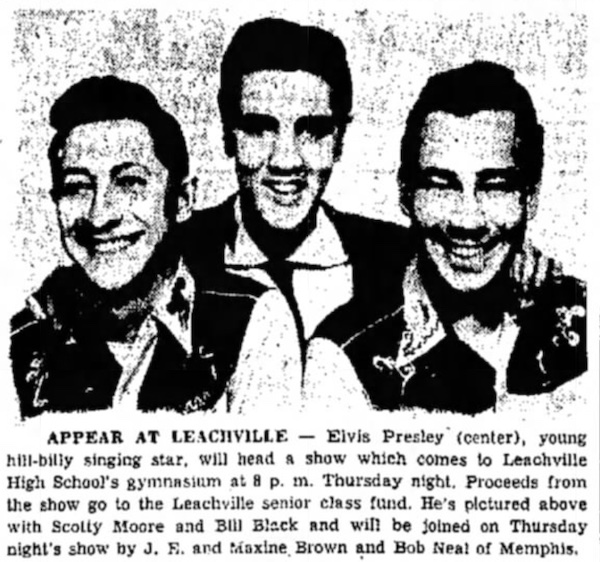
The Blytheville, Ark. Courier News: Jan. 19, 1955
Monday July 04, 2022
Movie Review: Top Gun: Maverick (2022)
WARNING: SPOILERS
Watching the original “Top Gun” back in ’86, I remember being surprised at the end when they went beyond maneuvers and actually engaged an enemy. I thought, “What the fuck? We’re not at war with anybody.”
Watching the sequel, “Top Gun: Maverick,” 36 years later, and at the end they engage the enemy, known simply as “the enemy,” who are faceless and voiceless. And I thought, “Makes sense. We’re at war with everybody.”
It’s been a helluva 36 years, hasn’t it?
Canyon run
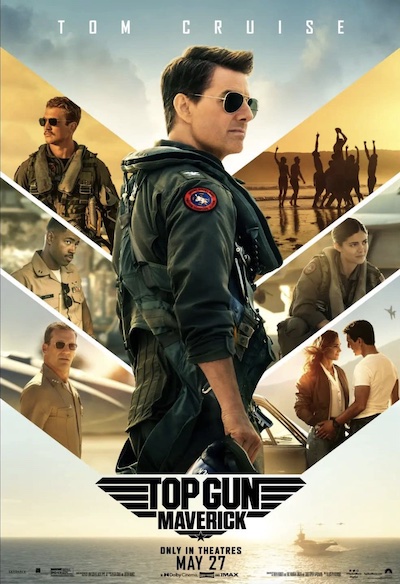 It’s nice that some of that shows up on Tom Cruise’s face. He’s still in great shape but he’s finally showing his age. Tom, you’re finally showing our age. Both of us were born in 1963, and there’s bags under the eyes and sags by the jawline (at least you have one), and those little puffy indentations by the mouth. Would’ve been nice, of course, if someone in the film had mentioned it. Or if he had. Or if he’d mentioned something about aging. “Acid reflux at zero gs is the worst.” “I really should’ve worn sunscreen during those beach volleyball games.” “I feel the need … the need to pee.”
It’s nice that some of that shows up on Tom Cruise’s face. He’s still in great shape but he’s finally showing his age. Tom, you’re finally showing our age. Both of us were born in 1963, and there’s bags under the eyes and sags by the jawline (at least you have one), and those little puffy indentations by the mouth. Would’ve been nice, of course, if someone in the film had mentioned it. Or if he had. Or if he’d mentioned something about aging. “Acid reflux at zero gs is the worst.” “I really should’ve worn sunscreen during those beach volleyball games.” “I feel the need … the need to pee.”
Instead, Capt. Pete “Maverick” Mitchell, nearly 60 now, still has better stamina and reflexes than the twentysomethings he’s training, such as “Rooster” (Miles Teller), “Hangman” (Glen Powell) and “Phoenix” (Monica Barbaro), all of whom were born a quarter century later. (The actors were all born after “Top Gun” was released.) It’s like pretending Cecil Fielder or Edgar Martinez, two '63 babies, could play better than Mike Trout or Juan Soto right now.
For what it is, though, “Top Gun: Maverick” is a fun movie. They do a good job. In that airless world.
I’d heard good things (Rotten Tomatoes: 96%/99%), but from the raves I was expecting something like “The Right Stuff,” and this doesn’t come close to that.
It does open with a kind of “Right Stuff” vibe, and not just because of Ed Harris. Maverick goes into work to fly his zoom-zooms and he’s told by his team that, since they’d never hit Mach 10, Admiral Chester “Hammer” Cain (Harris) is pulling funding to spend the dough on a different favorite project. Except Cain ain’t there yet. So Mav fires up the bird (no stick of Beeman’s), takes it to 10, then, being him, pushes the envelope. Oops. Down goes the bird. We skip the crash landing and cut to a frazzled Maverick in space-man outfit entering a crowded diner, where he chugs a glass of water and asks where he is. The awestruck boy near the cash register: “Earth.” Great line.
For the insubordination, Mav should be gone, fired, but he’s given another opportunity by his former rival and old pal, Adm. Tom “Iceman” Kazansky (Val Kilmer), to return to the “Top Gun” school and train the best-of-the-best for a new mission. That mission involves flying low and fast through enemy canyons, dropping a pinpoint bomb to blow up some uranium macguffins, then soaring over mountains and hopefully making an escape. It’s like the Death Star canyon run in the original “Star Wars” but without the whole “Use the Force, Luke.” Wait, I guess there’s that, too, since “Rooster” has to learn to trust his instincts. He has to learn to not think.
Oh, if they could only teach that to some of us critics.
“Rooster,” in case you didn’t know, is the son of “Goose” (Anthony Edwards) from the first movie, the pal who dies, the wingman our hero can’t save and who blames himself for the death. As a result, Mav and Rooster have issues. Not because Mav caused Dad’s death. You kidding? Pfft. No, it’s because Maverick initially prevented Rooster from following in Dad’s footsteps. We later find out that he promised the boy’s dying mother (Meg Ryan, unseen except for ’86 footage) to keep the boy from becoming a pilot—that’s why he did it. Also he really didn’t think he was ready. Turns out all these recruits have a thing like that: Rooster thinks too much, Hangman is too reckless and solitary, Phoenix is … No, I guess it’s just Rooster and Hangman. Everyone else is just there. A Benetton ad.
The goal is for the team to do the Kessel Run in under 2 ½ minutes and bond like a team. None of the recruits is able to do the former and the latter only comes in fits and starts. It mostly happens in that give-each-other-shit, sweaty-football-on-the-beach way. The bigger issue, for Mav, is those damn admirals. I keep referencing “Star Wars” but the movie is a little like “Star Trek” in this way. Mav is the balls-out captain without the green alien babes, just a shockingly beautiful Jennifer Connelly running the aviator bar, while Ed Harris, then Jon Hamm as Beau “Cyclone” Simpson, are the admirals who keep getting in the way. And when Iceman dies of cancer, Mav is cut from the project because Jon Hamm has a different idea about the Kessel Run. Why not 4 minutes instead of 2 ½? Right? So much easier. Sure, then the enemy will scramble its jets, etc., and our heroes probably won’t make it back alive. But mission accomplished!
Instead, Mav steals a plane, demonstrates that the run can be done in 2 minutes and 15 seconds, so Jon Hamm appoints him Team Leader for the mission. And for his team, Mav picks pretty lady, black dude, nerd boy and Rooster. And off they go to take it to the enemy.
Psst. They win.
Goose, Rooster, Loon
Admittedly, it’s thrilling. Throughout, director Joseph Kosinski (“Oblivion,” “Only the Brave”) and DP Claudio Miranda film the actors within the F-14s and 18s, and we can feel the difference. We can see the pressure on them. This ain’t green screen, kids. From the IMDb trivia page:
- Cruise's involvement was predicated on the condition that real aircraft be used in the aerial sequences, not CGI.
- Cruise personally designed a three-month aviation course for the new actors to get ready riding in F-18s.
- Three of the actors threw up every day of filming in the jets, per Miles Teller.
All of which accounts for a lot of the critical enthusiasm. The movie is real. It’s about heroes who are super rather than superheroes. And (admittedly again) it's not all sweaty football on the beach. The scene where Mav visits Ice, and they talk, is powerful and powerfully acted, particularly by Cruise. One shot in particular—myriad complex emotions crossing his face. I’m like “Damn, this dude can act when he wants.”
But you could write most of the characters’ personalities on a Post-It note. Connelly as Penny is given almost nothing to do. They’re exes, and she: 1) teases him feistily, 2) teases him softly, 3) leaves the door open for him. When he returns after the mission, she’s off sailing with her daughter. I guess to show she has her own life? Or to provide a thrum of last-minute tension? Right. Imagine if she never returned. Instead, in the final reel, yep, there she is, in magic-hour light standing next to a 1973 Porsche 911 S, like in a car commercial. That said, Connelly looks fantastic. And when was the last time we saw 50-year-olds making out in a movie?
Should the movie have worried more about Rooster? He barely knew his father, yet he: 1) trains at the same academy for the same job that killed the old man; 2) sports the same moustache; and 3) sings the same fucking song at the same fucking bar. Goodness gracious, that’s weird. Plus the whole double-o bird connection. (Was “Loon” taken?) But sure, let’s ignore all that. His issue is he’s “too cautious.” Until he isn’t—during the Kessel Run.
To be honest, hearing about “Top Gun: Maverick,” then seeing it and writing about it, I'm reminded how much I hated “Top Gun” back in the day. I guess I hated what its popularity meant. It meant the cynical period I grew up in was over. We were that much more mindless, that much more jingoistic, that much more ready to buy the bullshit. And every year it’s gotten worse. It’s almost as if we stopped thinking.
Monday April 04, 2022
Movie Review: The Batman (2022)

WARNING: SPOILERS
Matt Reeves’ “The Batman” is arthouse Batman: long, brooding and morally ambiguous. It’s reminiscent less of a superhero flick than David Fincher’s “Se7en”: two detectives, an elder Black officer and his white, hothead partner, attempt to solve a series of grisly, serial-killer murders. You know how recent Batmen swoop around Gotham the way Spider-Man swings around Manhattan—almost as if he had super powers? This ain’t that. This is a grounded Batman. He’s definitely a dude in a bat suit, who relies on gadgets and martial arts, determination and smarts. The first time he’s on the roof of some gothic skyscraper he doesn’t brood over the city in the rain but all but goes “Yikes!” Recent Batmen have been like ninjas, too—all of a sudden, poof, there—while the first time we see Robert Pattinson’s Batman, we actually hear him, slowly clomping up the steps like the Terminator. Nothing about him is fast. Nothing about the movie is fast. Nirvana’s “Something in the Way” plays several times on the soundtrack, which is appropriate because it’s the movie’s tempo. Exactly that. “The Batman” is like “Something in the Way” for three hours.
And it’s pretty great.
Who is director Matt Reeves and how the hell did he land this gig? Back in 2008, he directed the sleeper hit “Cloverfield”; then he was tapped to remake the great Swedish horror-vampire film “Let the Right One In” for American audiences, and did a great job. So he spent the next decade doing the “Planet of the Apes” sequels. Now this.
Oh, and Batman’s sexy again. About time.
John Doe
We begin the movie looking through the high-tech goggles of someone spying on a rich man and his kid in a townhouse. The kid is pretending to be a ninja and Dad is accommodating; he pretends to be stabbed. Then the kid goes trick-or-treating since it’s Halloween in Gotham City.
All the while, these were my thoughts:
- Are these the Waynes?
- Or is this another family and it’s the bad guy watching them?
- Or is it Batman watching them?
Right out of the gate, in other words, Reeves blurs the line between hero and villain. That’s a lot of the film. And not in the way of “You created me, I created you,” the Batman/Joker dynamic in the Tim Burton movie. Nobody says it, but I kept thinking, “OK, so Batman beats up a bunch of skull-faced subway punks while the Riddler (an excellent Paul Dano) is taking down the corrupt officials of Gotham City. Batman is fighting the symptom, the Riddler is fighting the cause. So why is the Riddler the villain again?”
Answer: He’s the villain because he’s insane and tortures people. Don’t do that, kids.
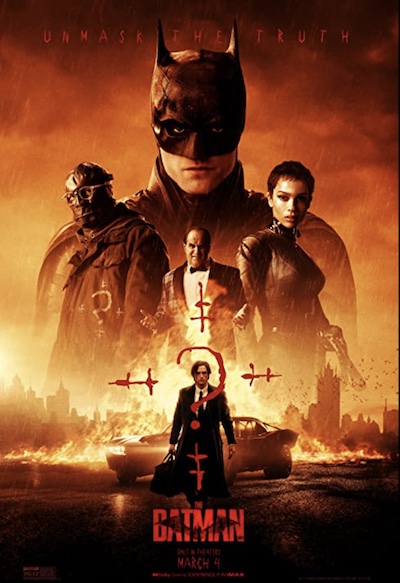 Anyway, yes, in the opening scene, it’s the Riddler’s eyes we’re looking through, after which the Riddler shows up as silent as a ninja in the townhouse and bludgeons the rich man—Mayor Don Mitchell (Rupert Penry-Jones)—to death. Then he gets out the duct tape. He’s big on the duct tape. When he stretches out a strip, it’s as loud on the soundtrack as gunfire in “Shane.” He also leaves clues/riddles and a message to the Batman. Not to taunt; I think he’s testing his smarts. He feels kinship. He wants partnership.
Anyway, yes, in the opening scene, it’s the Riddler’s eyes we’re looking through, after which the Riddler shows up as silent as a ninja in the townhouse and bludgeons the rich man—Mayor Don Mitchell (Rupert Penry-Jones)—to death. Then he gets out the duct tape. He’s big on the duct tape. When he stretches out a strip, it’s as loud on the soundtrack as gunfire in “Shane.” He also leaves clues/riddles and a message to the Batman. Not to taunt; I think he’s testing his smarts. He feels kinship. He wants partnership.
This is Year Two of Batman’s exploits, and he’s still this odd, caped vigilante around town. Most cops hate him, but he’s become the all-but-official partner of Lt. James Gordon (an excellent Jeffrey Wright), who is already using the bat signal when he needs to contact him. This is another stroke of genius to me. I’ve written about the bat signal before. It’s super-cool, I loved it as a kid, but it tends to mean we’ve left the Batman-as-vigilante phase (cool) and entered the Batman-as-institution phase (meh), which is a step away from Batman as camp (death). Here, Reeves manages to give us both Batman-as-vigilante and the bat signal. Because Gordon isn’t in charge yet. And the people who are in charge are corrupt.
Which is the point of the Riddler. Like John Doe in “Se7en,” he’s acting as judge, jury and executioner for the city’s sins. First it’s the mayor, then the police commissioner (Alex Ferns), whose face is eaten by rats during a livestream; then it’s the DA (Peter Sarsgaard), who is kidnapped and forced to crash a car, with a bomb locked around his neck, into the mass funeral for the mayor in midtown Gotham. All of these city officials are in the pocket of Carmine Falcone (John Turturro), the crime boss who runs the town from his penthouse above the Iceberg Lounge. So why doesn’t the Riddler just go after Falcone? Too logical, I guess. Way shorter movie. And how does the Riddler connect the dots between the mayor and the DA and the like? Was it common knowledge—like Mitch McConnell and dark money? Now there’s a Batman villain for you.
I keep using the term “the Riddler” but I don’t know if we ever hear it in the film, and he’s not exactly Frank Gorshin in a green leotard with question marks over it. (Though one of his lines is said with a very Gorshin-like inflection.) All the supervillains are mere suggestions of their comic book personas. The Riddler is a nerd accountant with crazy goggles and dark green hoodie. The Penguin (an excellent Colin Farrell), is a fat, squat crimeboss with a limp named Oz. Selina Kyle (a superhot Zoe Kravitz) is a martial arts-trained cat burglar, who, on the prowl, wears a mask with mere suggestions of ears. Plus the cats in her apartment. “I have a thing about strays,” she says to Batman, giving him a suggestive look. All three characters could fit into most crime/gangster movies and it wouldn’t look weird.
Meanwhile, Pattinson’s Batman looks iconically Batman—like a ’70s-era, Neal Adams drawing, but with dark cape/cowl rather than blue. He might look better than any Batman we’ve ever seen on screen. It should look weird—like “Se7en” with Brad Pitt in a bat outfit—but somehow it works. I assume because we expect it? I bet if you found someone who’d never heard of Batman, or superheroes, they’d think the whole thing was bizarre.
Pattinson makes it work, too. Like Edward from the “Twilight” series, he has a bruised, tragic stillness to him.* His Batman may mete out pain but he also exudes it. His Bruce isn’t the usual playboy, either. When he shows up at the mayor’s funeral, and the press goes crazy, Falcone (I think) calls him the only man in Gotham more reclusive than himself. He’s the city’s lost child, its poor little rich boy.
(* Has any actor played both vampire and Batman? I think Pattinson’s the first. He did it for the girls and now for the fanboys. OK, fangirls, too. He’s tall, quiet, tortured, mascaraed, passive. Selina makes all the moves. Their scenes together smoke.)
I like that there’s no slow-mo flashback to the murder of Thomas and Martha Wayne; it’s assuming we know that story by now. I like that Wayne Manor isn’t a mansion outside of the city but a city skyscraper. Initially, too, Batman gets around on a nondescript motorcycle, which blends, and the passage to his “bat cave,” is serpentine, with secret walls, making it, you imagine, difficult to follow. To be honest, I was almost disappointed when the Batmobile showed up for the car chase with Oz—which, despite the one cool moment (the Batmobile leaping through the flames), felt overlong and unnecessary: an action-adventure bit for a noirish police procedural.
Travis Bickle
Let’s ask the Mamet question: What do the characters want?
So Selina is trying to find out what happened to her friend, Annika, a fellow waitress at the Iceberg Lounge, who goes missing; that’s why she teams up with Batman. She’s also the illegitimate daughter of Falcone. Does he know? And was she working at the Iceberg Lounge to become part of his life or kill him?
Oz is the loyal henchman who turns out to be not-so-loyal. We don’t know much more about him.
We know what the Riddler wants but he keeps going astray. Yes, it’s weird to talk about a crazy dude who uses 1984-style torture devices “going astray,” but, to me, the Riddler does this with his fourth target: Bruce Wayne. Why does he go after him? The Riddler, nee Edward Nashton, was an orphan himself in Wayne Orphanage. But after Thomas and Martha were murdered, the orphanage wound up in the hands of Falcone and Oz, who pillaged it like Tony Soprano’s men, leaving the orphans starving. Yet every day he had to hear about “poor little Bruce Wayne,” surrounded by his wealth. And he came to hate him. He identified with Batman and hated Bruce Wayne, and he decides to kill him. But it’s off the mark: Bruce isn’t part of the city’s corruption. Is that why the Ridder’s M.O. changes? With the others, it’s close quarters and sadistic torture, but with Bruce he just sends him a bomb in the mail. Blah. Alfred (Andy Serkis) opens it instead. Blah. He survives. Blah.
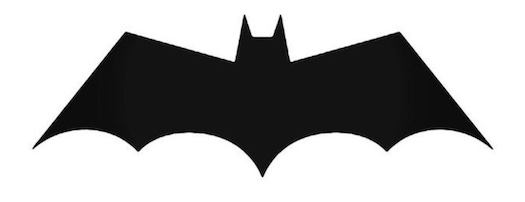 Then Riddler goes further astray. For most of the movie, his cinematic antecedent is John Doe in “Se7en,” and the sinners who need eradicating are the city’s fathers—the rich and powerful. In the final act, he’s all Travis Bickle in “Taxi Driver,” unleashing a real flood that, like Travis’ imaginary rain, will wash all the scum off the streets. It’s a big, grandiose moment but kind of a bummer. At least John Doe stuck to the plan.
Then Riddler goes further astray. For most of the movie, his cinematic antecedent is John Doe in “Se7en,” and the sinners who need eradicating are the city’s fathers—the rich and powerful. In the final act, he’s all Travis Bickle in “Taxi Driver,” unleashing a real flood that, like Travis’ imaginary rain, will wash all the scum off the streets. It’s a big, grandiose moment but kind of a bummer. At least John Doe stuck to the plan.
Batman changes, too, but in a way that makes sense. He has a trajectory. He begins the movie saying “I’m vengeance” to the subway punks, then realizes how corrupt the city leaders are, and that even his father was hardly a paragon of virtue; and at the end he’s confronted by one of the Riddler’s acolytes, who, when asked who he is, responds, “I am vengeance.” So the hero comes to realize his path is wrong, and rather than hurt criminals he winds up helping citizens caught in the flood. If the storyline were true to itself, in fact, this would be the moment when he unmasked himself—like Zorro at the end of the original 1920 “Zorro.” Basically it’s the moment he needs to be Bruce rather than Batman. But: sequels; moola. We even get a glimpse of Barry Keoghan as the Joker in Arkham Asylum. Warner Bros. primes that pump. Least shocking part of the film.
Despite that, I think this is the best Batman movie ever made. I love the scene in the police station where Batman is surrounded by cops, love Jeffrey Wright as Gordon, think Dano is a revelation (again), think Pattinson makes a great, brooding Batman. They’ll have a tougher go in the sequel. How do you scare criminals when you’re a beacon of hope? Good luck. Just don’t forget the Nirvana.
All previous entries
Baseball's Active Leaders, 2023
What Trump Said When About COVID
Recent Reviews
Everything Everywhere All at Once (2022)
Black Panther: Wakanda Forever (2022)
Doctor Strange in the Multiverse of Madness (2022)
Spider-Man: No Way Home (2021)
The Cagneys
A Midsummer Night's Dream (1935)
Something to Sing About (1937)
Angels with Dirty Faces (1938)
A Lion Is In the Streets (1953)
Man of a Thousand Faces (1957)
Never Steal Anything Small (1959)
Shake Hands With the Devil (1959)







